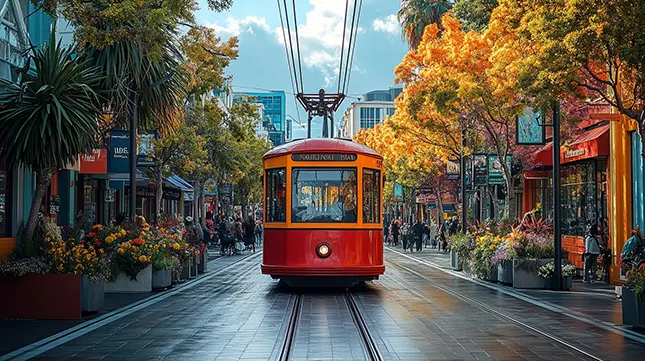Cost of Living in New Zealand vs UK

Are you thinking about relocating but are curious about the differences in the cost of living in New Zealand vs UK?
You’re not alone!
Known for its jaw-dropping scenery, friendly locals, and refreshingly laid-back pace of life, New Zealand, fondly called Aotearoa, the Land of the Long White Cloud, continues to attract thousands of British expats each year.
For many, the appeal lies in the lifestyle. With access to the great outdoors, clean air, and a strong sense of community, it’s easy to see why people make the leap.
But before booking that one-way ticket, it’s essential to understand the financial side of things.
Understanding the differences in day-to-day costs, from groceries and rent to healthcare and transportation, will help you prepare your budget and avoid surprises down the road.
And with global economies shifting frequently, staying informed about local conditions is key, especially since immigration processes can take time.
In this guide, we’ll explain what you need to know when comparing the cost of living in New Zealand and the UK.
House Prices Compared: Where Can You Get More for Your Money?

You may be surprised by the average house price in New Zealand.
One of the first considerations for expats who intend to stay in New Zealand long-term is the cost of buying a home there.
When it comes to buying property, both New Zealand and the UK share a common rule: city living comes at a premium. But dig a little deeper, and the numbers tell an interesting story.
According to Opres Partners, the average house price in New Zealand was NZD $913,000 (approx. £404,000) as of February 2025.
When looking at the latest data from the UK Office for National Statistics, that’s significantly higher than the UK’s average house price of £290,000 (about NZD $655,000).
At face value, it appears that New Zealand is the pricier option but, location is everything.
Auckland, the country’s costliest city, has a median house price of NZD $1,050,000 (approx. £466,000), while London leads the UK charts with an average home costing £763,000 (roughly NZD $1.7 million).
Looking for better value? Consider Wellington, where the average price is around NZD $755,000 (£335,000), or head to the West Coast region where homes can be found for as little as NZD $375,000 (£166,000).
New Zealand also offers an edge when it comes to space.
Outside of city centres, homes often sit on larger plots, giving families room to breathe and space for that all-important backyard barbecue.
In contrast, UK homes, especially in urban zones, tend to be more compact, both indoors and out.
If you want a true reflection of the cost of buying a home in New Zealand, check out the Realtor.com website for a list of the best estate agents in the country and explore their websites.
What Will a Weekly Food Shop Cost You in NZ Compared to the UK?

Food shopping is typically more expensive in New Zealand.
One of the most noticeable differences for newcomers in New Zealand is the cost of groceries. While the selection is fantastic, especially if you love fresh produce and locally sourced meat, it often comes at a higher price point than in the UK.
According to data from Numbeo and Expatistan it is a mixed bag when it comes to the price of food, here’s what you can expect to pay in March 2025:
- 1 litre of milk: NZD $2.98 (£1.32) – UK: £1.24
- Loaf of white bread (500g): NZD $3.22 (£1.43) – UK: £1.30
- 12 eggs: NZD $10.75 (£4.76) – UK: £3.96
- 1kg potatoes: NZD $3.46 (£1.53) – UK: £1.20
- Mid-range bottle of wine: NZD $16.00 (£7.09) – UK: £8.50
- Pack of cigarettes (20): NZD $40.00 (£17.72) – UK: £15.00
- Dinner for two at a mid-range restaurant: NZD $125 (£55) – UK: £70
While individual tastes and dietary choices will influence your overall spending, on average, grocery prices in New Zealand are around 35–40% higher than in the UK.
However, discount chains like Pak’nSave and Woolworths can help you save if you’re smart about where you shop, just as stores like Aldi and Lidl do in the UK.
Being open to switching brands or shopping seasonally can also make a noticeable difference to your weekly food bill.
How Energy Costs Compare Between NZ and the UK

You are likely to save money on energy when moving to New Zealand from the UK.
Energy prices have been a hot topic in recent years, particularly in the UK. Since the COVID-19 pandemic and the war in Ukraine, households have felt the sting of volatile gas prices and soaring electricity bills.
The UK’s energy grid relies heavily on natural gas, which makes it vulnerable to international market swings, despite increased efforts to expand wind, solar, and other renewables.
New Zealand, on the other hand, enjoys a more stable energy landscape.
With over 80% of its electricity generated from renewable sources, especially hydroelectric and geothermal, Kiwis benefit from a greener and often more affordable energy supply.
According to Numbeo, the average monthly utility bill (covering electricity, heating, cooling, water, and rubbish collection) for an 85m² apartment in March 2025 is:
- New Zealand: NZD $229.00 (approx. £101)
- United Kingdom: £239 (approx. NZD $540)
That’s nearly double the cost in the UK, making energy one of the areas where New Zealand can offer a financial advantage, especially if you plan to live in a modern, energy-efficient home.
How Do Salaries Stack Up in New Zealand vs the UK?

Salaries tend to be higher in New Zealand.
If you plan to continue working after relocating, it’s important to know how much your salary will stretch.
While many assume New Zealand’s pay rates are lower than the UK’s, the reality is more nuanced and often quite balanced.
According to Numbeo, the average monthly net salary in New Zealand is NZD $5,003 (approx. £2,215), compared to the UK average of £2,379 (around NZD $5,371).
The gap is minimal, but the cost of living and taxation structures differ, affecting your take-home comfort.
Here’s a breakdown of some typical roles and how salaries compare (rounded and updated for 2025):
Banking & Finance: NZ – NZD $107,000 (£47,390) | UK – £45,000 (NZD $101,60)
Education: NZ – NZD $101,000 (£54,03) | UK – £42,000 (NZD $95,000)
Software Developer: NZ – NZD $130,000 (£57,58) | UK – £50,000 (NZD $113,000)
Civil Engineer: NZ – NZD $95,000 (£42,000) | UK – £48,500 (NZD $108,000)
Salary differences will, of course, depend heavily on your sector, experience, and location.
To explore current roles and pay scales, check out seek for New Zealand opportunities or Indeed UK for British listings.
You can also find out what jobs are most in demand in the country which will help speed up your visa application.
Paying Your Way: Income Tax in New Zealand vs the UK

New Zealand typically offers lower tax rates for higher earners.
Taxes might not be the most thrilling part of relocating, but understanding how your income will be taxed is essential when planning your financial future abroad.
New Zealand and the UK both operate progressive tax systems, meaning your rate increases as you earn more.
However, there are key differences in how these thresholds are structured and they can have a real impact on your take-home pay.
New Zealand Income Tax Rates (new tax rates from 1st April 2025)
- Up to NZD $15,600: 10.5%
- NZD $15,601 – $53,500: 17.5%
- NZD $53,501 – $78,100: 30%
- NZD $78,101 – $180,000: 33%
- Over NZD $180,001 and over: 39%
Official source: Inland Revenue NZ – Income tax rates
UK Income Tax Rates (2025)
- £0 – £12,570: 0% (personal tax-free allowance)
- £12,571 – £50,270: 20% (basic rate)
- £50,271 – £125,140: 40% (higher rate)
- Over £125,140: 45% (additional rate)
Official source: UK Government – Income Tax Rates
In short, New Zealand generally offers lower tax rates for high earners, while the UK provides a more generous tax-free allowance, which benefits those on modest incomes.
To get a clearer picture based on your earnings, you can try:
- NZ tax calculator: www.ird.govt.nz/income-tax/income-tax-for-individuals/tax-codes-and-tax-rates-for-individuals/tax-rates-for-individuals
- UK income calculator: https://www.gov.uk/estimate-income-tax
It’s wise to speak to a qualified tax advisor, especially if you’ll be earning across both jurisdictions. They can help ensure you stay compliant and avoid any unwelcome financial surprises.
Is Healthcare Better in New Zealand or the UK? A Cost and Care Comparison
Ensuring everyone has access to good healthcare is vital and a concern for those who may be unsure how the system works in New Zealand.
Both countries are known for offering strong, publicly funded healthcare systems, but a few key differences might sway your preference, depending on your lifestyle and health needs.
Public Healthcare Systems
The UK’s National Health Service (NHS) is funded through taxation and provides comprehensive, free-at-the-point-of-use care to all legal residents.
It’s managed by the Department of Health and Social Care and covers everything from GP appointments to hospital treatment and emergency care.
In New Zealand, the Ministry of Health oversees a similar tax-funded system.
Citizens, permanent residents, and many visa holders have access to subsidised healthcare, including general practice and hospital care.
The key difference? New Zealand’s system may require small out-of-pocket fees for some primary care services.
GP Access
Both countries use General Practitioners (GPs) as the first point of contact.
In the UK, GP visits are free. In New Zealand, you’ll usually pay a small fee unless you’re under 14 or hold a Community Services Card.
Prescription Charges
- UK: £9.90 per item, though exemptions apply for certain groups (e.g., under-16s, pensioners, those with long-term health conditions).
- New Zealand: Just NZD $5 per item (approx. £2.21), unless you fall into one of the following groups: – Aged 13 years or under – A Community Services cardholder (or a dependent child of a cardholder) – Aged 65 years or over – Hold a Prescription Subsidy Card (PSC)
Private Options
Both countries also have thriving private health sectors.
In the UK, services like Bupa and AXA Health offer fast-track treatment and access to private facilities.
New Zealanders often use a mix of public and private care, with insurers like Southern Cross Health Society providing cover for specialist care and elective surgery.
Health insurance premiums vary depending on age, lifestyle, coverage level, and pre-existing conditions. Smoking and chronic illnesses may increase premiums in both countries.
For a more comprehensive overview to the healthcare system in New Zealand and how it works, follow this link.
How Transport Costs Differ Between New Zealand and the UK

There are some major differences between travel in the two countries.
Transport is an essential part of daily life and depending on where you’re living, your costs and options can vary significantly.
The UK’s transport system is more extensive, while New Zealand offers a more flexible, car-friendly lifestyle, particularly outside its major cities.
Public Transport
The UK boasts a comprehensive public transport network, with interconnected trains, buses, and trams reaching across urban and rural areas.
Services like National Rail, Transport for London, and local bus providers make getting around easy, if at times sometimes expensive.
In contrast, New Zealand’s public transport infrastructure is more limited, especially in rural regions due to the distances in between locations.
Major cities like Auckland, Wellington, and Christchurch do offer reliable bus and train services.
There are also scenic ferry routes, such as the Interislander, connecting the North and South Islands.
Here’s a cost comparison (as of March 2025):
- Local one-way ticket: NZ: NZD $4.00 (£1.77) | UK: £2.40 (NZD $5.42)
- Monthly pass: NZ: NZD $200 (£88.58) | UK: £70 (NZD $158)
While daily fares are cheaper in New Zealand, monthly travel in the UK often proves more cost-effective, especially for commuters.
Car Ownership
New Zealanders tend to rely more on cars, particularly outside city centres.
Used cars are relatively affordable, with a reliable vehicle costing between NZD $5,000 and $10,000 (£2,200 £4,400).
In comparison, UK car prices especially for similar models, can be significantly higher.
For example, a used Toyota Mark X might cost £8,000–£12,000 in NZ, but up to £25,000 in the UK.
Running costs also favour New Zealand drivers:
- Annual vehicle expenses (NZ): NZD $3,200 (£1,417) versus (UK): Over NZD $6,100 (£2,700)
- Fuel prices are around 14% cheaper in New Zealand
- Car insurance (fully comprehensive): NZ average: NZD $300–$400 (£133–£177)
UK average: Typically, £500–£700 (NZD $1,129–$1,580)
In New Zealand, many towns offer free or low-cost parking, further reducing costs.
Meanwhile, UK drivers often face hefty charges for parking permits, congestion zones, and road tax.
If you’re planning to drive regularly, New Zealand offers greater affordability for both purchase and ongoing car expenses.
But if you’re relying on trains or buses, the UK wins on network depth and monthly travel savings, especially in cities.
Comparing Childcare Costs in New Zealand and the UK

Take note of the typical childcare expenses if you are moving with kids.
If you’re moving with children, understanding childcare expenses is another important consideration when budgeting your new life abroad.
These days, many families find that both parents need to work in order to enjoy a higher standard of living.
While both New Zealand and the UK offer various options for early childhood care, the price difference can be striking, especially for full-time services.
According to Numbeo’s March 2025 data, the average monthly cost of full-time private preschool or kindergarten (for one child) is:
- New Zealand: NZD $1,100 (approx. £487)
- United Kingdom: £970 (approx. NZD $2,190)
This means childcare in the UK is about 75% more expensive than in New Zealand, making NZ a far more affordable place for both parents who need to work.
Additionally, New Zealand offers 20 hours of free early childhood education (ECE) per week for all children aged 3 to 5 through licensed providers.
You can learn more about this benefit via the New Zealand Ministry of Education.
In the UK, some families may be eligible for 30 hours of free childcare for 3- and 4-year-olds, depending on their income and employment status.
Details are available via the UK Government childcare portal.
Ultimately, while both countries offer helpful subsidies, out-of-pocket childcare costs are considerably lower in New Zealand which is a major plus for expat families looking to settle without stretching their finances too far.
Final Thoughts on the Cost of Living in New Zealand vs UK

Is New Zealand a good fit for you?
Comparing the cost of living in New Zealand versus the UK isn’t a simple exercise and is by no means a like-for-like comparison.
While statistics can give you a snapshot of expenses, like housing, groceries, and transport, they only tell part of the story.
Culture, lifestyle, and your personal priorities weigh just as heavily.
On balance, recent data suggests that living in New Zealand can cost more overall, especially in categories like food and housing.
However, the differences aren’t always dramatic, and how much you spend will depend on your location, lifestyle, and income.
The UK may have the edge on public transport and certain subsidies, while New Zealand offers better value in areas like car ownership, childcare, and space per home.
But ultimately, the cost of living is only one piece of the puzzle if you are seriously considering a relocation to New Zealand.
The country is a fabulous place to live, work and raise children with a lifestyle like no other, a compelling argument for sure.
Getting Your Belongings to New Zealand

With your visa approved, job secured, and cost-of-living research complete, it’s time for the next big step, shipping your personal belongings safely to New Zealand.
International moves require careful planning, as shipments door to door can take approximately 10-12 weeks to arrive.
From packing up your home to navigating customs regulations, having the right team by your side can make all the difference.
That’s where White & Company comes in. As seasoned experts in overseas removals, we have helped thousands of families successfully relocate to the Land of the Long White Cloud.
Whether you’re shipping an entire household or just a few essentials, our highly trained removal crews ensure everything is handled with care, efficiency, and professionalism.
White & Company are proud members of the British Association of Removers (BAR), OMNI, and FIDI Global Alliance—three of the industry’s most trusted regulatory bodies.
This means your move is backed by international standards for quality and service.
Getting started is easy. Visit www.whiteandcompany.co.uk to request a free, no-obligation home survey, complete a quick quote form, or chat directly with our online assistant.
Prefer to speak to someone? Our team is just a phone call away and ready to support your relocation every step of the journey.
Start your new life in New Zealand the right way—with a reliable partner by your side.

Max is a seasoned writer and blogger in the real estate and home moving sectors, as well as a knowledgeable source of information for expatriates living and working abroad. His detailed insights have helped thousands of people move and live abroad with greater simplicity and ease.
Posted in: News
Leave a Comment (0) ↓



